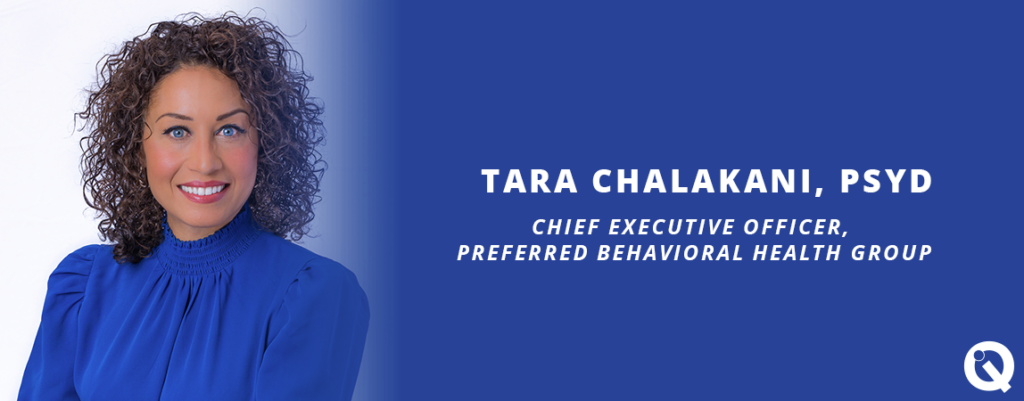Tara Chalakani, PsyD, CEO of Preferred Behavioral Health Group. The organization is a member of the Quality Institute’s Provider Council.
There is so much work to be done in the behavioral health space right now, what are your top priorities as you settle into your new role?
We provide mental health and substance abuse education, prevention, support, and treatment to over 30,000 people every year. My first priority is to raise awareness of who we are and what we do. We serve 14 counties, run 70 programs, and employ over 400 people. The more people know about us, the more people we can help.
How does the Quality Institute support your work in addressing these priorities?
Having the Quality Institute as an ally in spreading the word is imperative. The other piece is that we share the Quality Institute’s commitment to health care quality. We have a talented and robust Quality and Compliance Department motivated to make us the best organization that we can be as far as outcomes — and we have meaningful data that informs what we do every day. Having a close connection to the Quality Institute enhances that work.
Preferred is an integrated care organization. We are committed to whole person health, and we’re very aware of what a chronic mental health disorder does to the body as it relates to psychopharmacology and some of the health risks. We look at the big picture and the Quality Institute is very much committed to that integration as well.
How can cities and towns collaborate with Preferred Behavioral Health to address the mental health needs of their communities?
We are deeply engaged with the communities that we serve. We’re involved with the Quality Institute’s Mayors Wellness Campaign. Often, we’ll hear, “Hey, there’s a mayor in this town who could really use help with stigma reduction, or prevention, or engaging students on being smoke free.” We’re willing to be a partner. We look at every interaction with the community as an opportunity to educate, to create awareness, to support, and to serve. Preferred has been partnering with communities as an organization for over 45 years — it’s something that we’re deeply committed to.
The Mayors Wellness Campaign’s Healthy Town Awards recently recognized towns that adopted stigma-reduction campaigns. Why is that important?
Stigma is really the biggest obstacle to anyone accessing the correct or proper behavioral health care. I try to always use an analogy for physical health. If you had a broken bone, you would not hesitate to visit an orthopedic surgeon or an orthopedic doctor or go to physical therapy. But we have this persistent stigma that hangs like a dark cloud over psychiatry, getting therapy, and any kind of mental health disorder. Yet the likelihood of being touched by a mental health disorder — whether it’s yourself or a family member — is basically a one-out-of-two possibility in your lifetime. We need to really embrace mental health treatment and normalize the fact that behavioral health is physical health.
And more people are seen by primary care providers for mental health needs than they are by behavioral health practitioners. We really need to change that practice. For instance, Xanax is one of, if not the most, commonly prescribed medications, and less than half of the people who carry a prescription for Xanax have ever been seen by a mental health provider.
Finally, we like to ask somebody a question outside their professional role. What is your favorite hobby or skill?
I will preface my answer by saying that being in this field, self-care is critical. We cannot provide quality services if we are not investing in ourselves. We are a trauma-informed organization so self-care is a key component of that. We always say, “You cannot pour from an empty cup.”
I spend a lot of quality time with my loved ones and surround myself with a beautiful group of people, family, and friends who are positive, upbeat, and really support one another. I like to travel. I always have something on the books. I also have four dogs, four dachshunds, and I believe time with animals enhances our lives.

